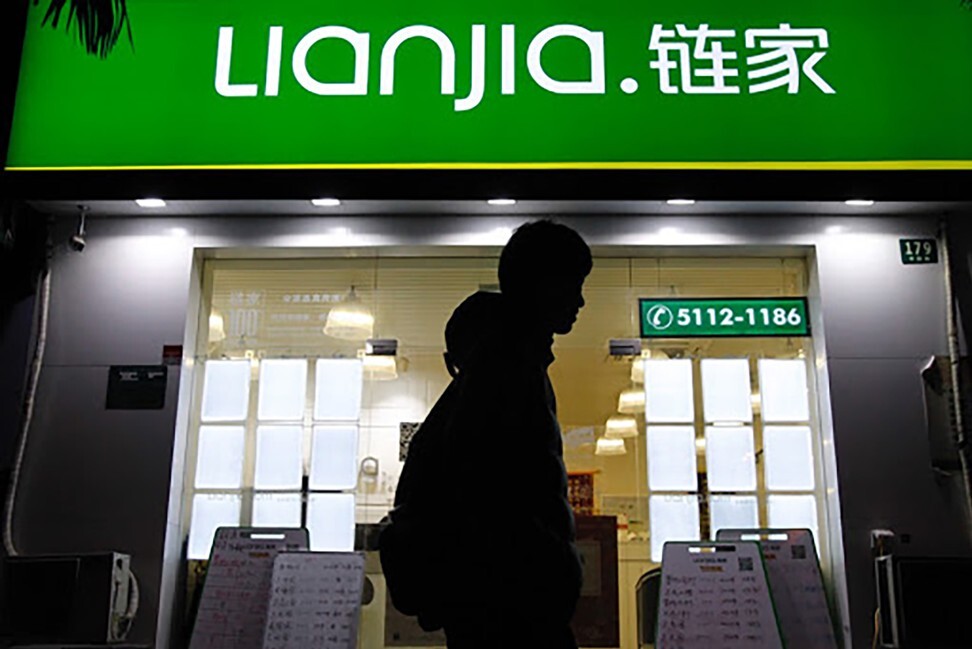
Tencent-backed Beike surges on NYSE debut after solid IPO reception, shrugging off ‘external noise’ amid frayed US-China relations
- China’s biggest real estate transaction platform raised US$2.12 billion from IPO at price above indicative range, the most in more than two years
- Stock jumps 87 per cent on the first day of trading in New York trading, valuing company at just under US$40 billion
Its American depositary shares (ADS) fetched US$35.06 in opening trades, compared with its IPO price of US$20. The ADS closed at US$37.44 each for an 87 per cent gain, the second-best Chinese US IPO debut among since January 2019, according to Dealogic.
This values China’s biggest online real estate transaction platform, better known at home as Beike Zhaofang, at just under US$40 billion, versus US$14 billion at its pre-IPO private funding round in March.
The company, backed by investors including Tencent Holdings and SoftBank Group, raised US$2.12 billion by selling 106 million ADS to investors. Beike’s IPO is the largest Chinese company listing in the US since video platform owner iQiyi collected US$2.4 billion in March 2018, according to Refinitiv.
The early performance shows there is a strong appetite from global investors for Chinese issues, according to chief executive Stanley Peng Yongdong, even after the US have introduced legislation and other proposals to place them under US auditing oversight on the threat of expulsion.
“Shrugging aside the external noise, it is the fundamental and the future growth of a company that matters to investors,” Peng said in a telephone interview with the South China Morning Post late on Thursday. “Housing, which is what we cover, is a very important part of every individual's life and it plays an important role in China’s economy.”
“Liquidity is better, the scale and volume is bigger here in the US,” Peng said. “Investors in the US are more willing to look thoroughly on new ideas and new models. We are integrating technology with housing transactions and home-related services, such as using virtual reality technology for home viewing and providing interior design solutions to new homes.”

They will be asked to comply or delist by January 2022, according to recommendations submitted earlier this month by the President’s Working Group on Financial Markets.
“We are closely following how such policies might impact us, and we believe there will be some solutions eventually,” Peng added. “Things like this are not something that we can anticipate and as long as we can keep ourselves in compliance, we would be fine.”
There is also no dearth of investor demand or liquidity in Hong Kong and mainland Chinese exchanges, which has helped pave the “homecoming” of Chinese technology companies like JD.com and NetEase this year. Others like Baidu, Ctrip and Yum China may follow too, according to news reports.
China’s biggest chip maker, Semiconductor Manufacturing International Corp. (SMIC), completed its 53 billion yuan (US$7.6 billion) stock offering in July on Shanghai’s Star Market, the biggest onshore IPO in a decade. Its ADS were delisted from the New York Stock Exchange in June 2019.
Chinese companies face January 2022 comply-or-delist deadline under new US audit, disclosure recommendations
Peng said the company is also actively looking for possibilities in terms of a second listing in mainland China and Hong Kong stock markets.
Beike Zhaofang generated 12.6 billion yuan of revenues from existing home sales recorded on its platform in the six months ended June 30, and 14 billion yuan from new home sales, according to its prospectus. Gross transaction volume of homes amounted to 779 billion yuan and 493 billion yuan, respectively.
Its 46 billion yuan of revenue for the full year in 2019 was about treble the amount generated by Beijing-based and New York-listed 58.com, owner of Anjuke, Beike’s closest competitor at home.
However, the property brokerage industry is facing strong headwinds, caused by a sputtering economy and a slowdown of the country’s housing market increase, according to analysts.
“The market will shift from a rapid booming era to a stable growing one and we will see a faster growing existing home market, which Beike has always been good at, emerging in China,” said Peng.
In matured housing markets, for example in the US, the rate of home changing is about 3.8 per cent compared with 1.1 per cent in China, he added.
“Even in top tier cities, it was only 2 per cent. We see huge growth potential here.”

